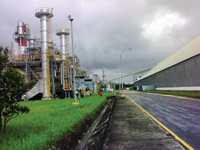
JAPAN’S biggest refiner seeks continuous and stable flow of energy from Kuwait and greater cooperation with its oil companies, including naphtha trading, a top company official says.
“Kuwait has long been a reliable petroleum supplier to Japan. I hope the country will maintain the contribution to stable and flexible supply of oil for the Japanese people, which is a goal that our company aims to achieve,” chairman of JX Holdings and its downstream unit JX Nippon Oil and Energy Corp Yasushi Kimura says.
“Moreover, we wish to chase the opportunities to materialise naphtha imports as petrochemical feedstock are expected to grow after we convert the 180,000 barrels-per-day (bpd) Muroran refinery into a petrochemical plant,” he notes.
JX has stopped a crude oil distillation unit of the Muroran refinery in northern Japan in March 2014 as part of efforts to reduce excess oil refining capacity, and convert it into a petrochemical plant from June 2014.
Some of its petrochemical products are going to be used for a newly-established paraxylene joint venture in South Korea that will go on-stream this year. Kimura also expressed hope that JX and state-owned Kuwait Petroleum Corporation (KPC) and its subsidiaries will enhance business ties beyond mid- and long-term oil trading. Noting that his company is teaming up with Kuwait Foreign Petroleum Exploration Company (Kufpec) in oil and gas development projects in northwest Australia, Kimura says JX is keen on promoting future joint projects with Kuwait in Australia and elsewhere.
According to Kimura, JX and Kufpec began commercial oil production at the Finucane South offshore oilfield in May 2013 with output at 12,000-13,000 bpd. JX Nippon has a 25 per cent stake in the concession, while Kufpec’s Australian unit and the project operator Santos of Australia evenly own 37.5 per cent.
Moreover, production period of the adjoining Mutineer-Exeter oilfields, also jointly owned by JX, Kufpec and Santos, is expected to be longer than initially estimated, Kimura says.
“Furthermore, the joint venture will start exploratory drilling this area in the near future, and I think there is great potential to discover enough oil reserves. The development projects at the Finucane South and Mutineer-Exeter oilfields are considered as JX’s operating base in Australia. With the Australian projects as a start, we hope to build stronger partnerships than ever with Kuwait,” the chairman says.
JX has the country’s largest oil refining capacity and the top share of fuel sales. Asked about the impact on oil trading with Kuwait from Japan’s declining petroleum demand chiefly due to the falling birth rate, the aging population, and energy-saving technologies, Kimura responds: “It is inevitable that oil demand in Japan will continue to decline. Taking this into account, our company should construct a rational and efficient production system.”
JX reduced the total refining capacity at its eight refineries across the country from 1.8 mbpd to 1.4 mbpd by October 2010. With the stopping of a crude oil distillation unit of the Muroran refinery in March 2014, JX’s total refining capacity will further fall to 1.2 mbpd.
“JX’s demand for oil is expected to gradually shrink, but there will be fluctuations in demand, and I’d like to ask the Kuwaiti side to ensure stable and flexible oil supply, while sharing various information and strengthening ties,” he says. The chairman also touched on the need for the assessment of the effects of the 2013 Fukushima nuclear accident following the devastating earthquake and tsunami. Japan has increased its imports of fossil fuels as all 50 of the country’s nuclear reactors are currently offline.
Meanwhile, Kimura says JX is currently participating in the joint study “Feasibility Study for Treatment and Effective Usage of High Salinity Oilfield Produced Water (Kuwait)” being conducted by Japan Cooperation Center, Petroleum and Kuwait Institute of Scientific Research (KISR) for the fiscal year 2013.
The Tokyo-based Arabian Oil Company (AOC) was the participant of this study for the fiscal year 2012, and JX Nippon succeeded AOC’s role for this fiscal year. In addition, JX started training programs for operating staff of Kuwait’s refineries. Last June, 13 people from Kuwait National Petroleum Company (KNPC) took the course in Tokyo and Niigata to learn Japan’s technology, according to Kimura.
“We wish to have opportunities to provide Kuwait with development technology.” Kimura, who also serves as President of Japan’s Petroleum Association and Chairman of the Japan Business Federation’s Committee on the Middle East and North Africa, highlighted Japanese firms’ keenness to offer cooperation in various areas.
“Kuwait’s diversification and sophistication of domestic industry would become a pivotal issue for Kuwait itself. JX and other Japanese firms are willing to contribute to the national development of Kuwait in many fields, such as infrastructure-building and renewable energy,” he says.















































































.jpg)

